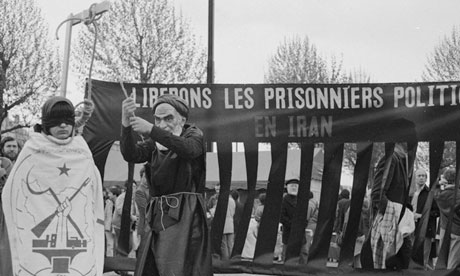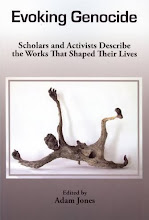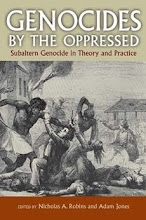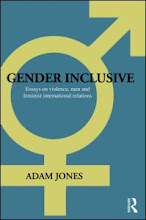 |
| "Iranian exiles stage a mock hanging by Ayatollah Khomeini in Place de la Bastille, Paris, on 1 May 1982 in a protest at executions of prisoners." (Roger Viollet Collection/Getty Images) |
By Owen Bowcott
The Guardian, October 18, 2012
"As political liquidations go, it is a massacre that ranks alongside some of the worst excesses of the 20th century: at least 20,000 Iranians executed in prison in the 1980s. Yet it received scant international attention. Unlike the carnage of Srebrenica or the purges of General Pinochet's coup in Chile, there was little worldwide outrage, and no opportunity for justice and legal redress. But this month the killings, perpetrated by then-Ayatollah Khomeini's regime, will be examined by an independent tribunal in The Hague in a process that exposes the shortcomings of the international justice system. The hearing, aimed at uncovering the truth of what occurred in Iran's jails, highlights the selective nature of what goes before the UN's courts and special tribunals. Founded in 2007 because no official judicial body would investigate complaints against Iran, it is a cross between a people's truth commission and a formal legal indictment. It is based on the model developed by a private international war crimes tribunal established in 1966 by Bertrand Russell and Jean-Paul Sartre to investigate the US war record in Vietnam. The focus of the Iran tribunal is the mass executions carried out inside the country's jails from 1981-89 of political prisoners, men and women. About 4,500 people, many teenagers and from leftwing groups, died in summer 1988 alone, according to Amnesty International. Iranian exiles claim 20,000-30,000 prisoners died in total -- victims of a fatwa issued by Ruhollah Khomeini, then head of state. The extent of the killings has been largely ignored by the west.
British lawyers on the tribunal's legal steering committee include Prof John Cooper QC and Sir Geoffrey Nice, a former prosecutor at the international criminal court (ICC) and Gresham professor of law. Other founders were the former South African minister Kader Asmal, who has since died, and the UN rapporteur on Palestinian human rights, Prof Richard Falk. All are unpaid. In a recent lecture, Nice drew attention to the gaps in international justice. 'War crimes courts and tribunals established over the last 20 years have changed the way the world citizen can think,' he said. 'As a result the world citizen may assume that they, like national courts, are part of a coherent, judicial crime and punishment system that happens to be international. Nothing could be further from the truth.' [...]"














No comments:
Post a Comment
Please be constructive in your comments. - AJ